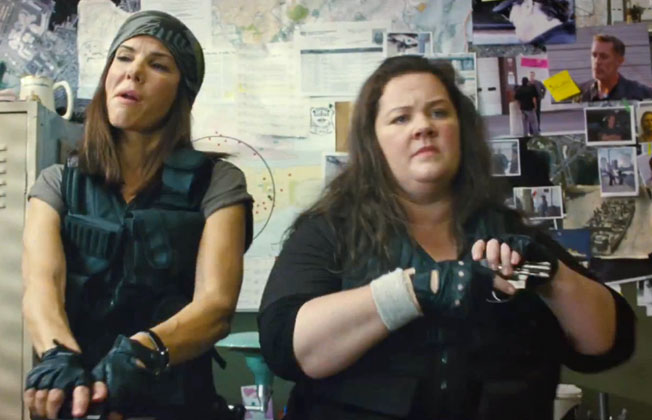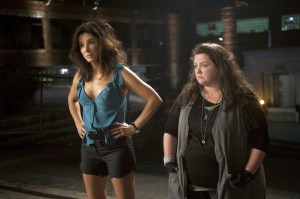Film Review: “The Heat” — An Amusingly Rude Buddy Cop Comedy Set in Boston
The Heat plays with clichés from a long line of mismatched buddy cop comedies, and it’s as good as any in the genre’s pantheon.
The Heat. Directed by Paul Feig. At cinemas around New England.
By Betsy Sherman.
No doubt about it, the Freaks and Geeks (F&G) alumni are at the top of their game this month. Linda Cardellini pierced Don Draper’s armor on Mad Men, Seth Rogen and James Franco are killin’ it in the apocalypse comedy This Is the End, and now F&G creator Paul Feig gives us a fabulously rude (though kind of heartwarming) summer comedy, The Heat. Feig, best known as the director of Bridesmaids, again delivers an R-rated laugh-fest full of, as an antagonist in The Heat says, “estrogen flyin’ around.” The movie plays with clichés from a long line of mismatched buddy cop comedies, and it’s as good as any in the genre’s pantheon. As a bonus, the Boston setting gives the movie an extra shot of flavor.
You could say Melissa McCarthy plays the freak, hard-charging Boston police detective Shannon Mullins and Sandra Bullock most definitely plays the geek, New York-based FBI agent and law-enforcement encyclopedia Sarah Ashburn. McCarthy as Mullins is like ’90s wrestler Bam Bam Bigelow with dimples—a rule-breaker who’ll do anything to get a collar. Bullock, on the other hand, makes Ashburn come off as the self-congratulating high achiever you’ve always loathed.
Only minimum brain power is needed to keep track of the plotline that brings these two women together: blah-blah-blah drug dealer connect-the-dots from blah-blah mid-level supplier to muckety-muck kingpin. Not that the cast members playing these roles are slouches (Spoken Reasons as the dealer at whom Mullins heaves a watermelon, Kaitlin Olson as the diffident, Eastern-European middle-person, and Michael McDonald as the effete supplier are all very funny). It’s just that the police procedural stuff is secondary to the relationship story.
Ashburn has been told that if she can catch Boston’s mystery kingpin, she’s a cinch for a promotion. For Mullins, the case is more personal. A partnership is born between the rage-fueled, foul-mouthed cop and the straight-laced, preachy agent. After colorfully butting heads, they initially bond in admiration of Mullins’ private arsenal, which includes rickety grenades inside her fridge. When the women need to trap a bad guy in a dance club and the only bait they have to throw at him is Ashburn, Mullins gives the all-business agent a quick makeover after declaring her drab wardrobe a “boner killer.”

Sandra Bullock and Melissa McCarthy prepare to go after the bad guys in THE HEAT. Photo: 20th Century Fox.
We eventually find out why each of the women is the way she is: Ashburn’s drive to be perfect springs from her childhood, while Mullins’s anger has to do with her family’s rejection of her after she put her addict brother (Michael Rapaport) in prison to get him off the streets. Many a comedy has been ruined by the mishandling of heart-warming emotional scenes (cue syrupy music, push in to close-up), but Feig and screenwriter Katie Dippold (Parks and Recreation) keep these revelations pointed and concise. The dive-bar setting helps undercut the sentimentality. Before you can say boo-hoo, Ashburn is digging something enormous out of her nostril. In a drinking montage, the now-closer partners shake it to “Groove Is in the Heart” and inevitably slow-dance with 80-year-old rummies.
The battling Mullins family—cinematic kin to the Wards in The Fighter—appear in a few explosively funny scenes. Jane Curtin is Shannon’s pickle-puss mother; her loudmouth brothers and their equally confrontational girlfriends are played by Massachusetts natives Bill Burr, Joey McIntyre, Nate Corddry, Jessica Chaffin, and Jamie Denbo with gloriously crass Boston accents. “Are you a nahhhk?” Corddry asks Bullock, who, once she understands the question, shouldn’t have answered that she’s a “special” agent.
McCarthy shows once again that she’s probably the best physical comic around as well as unmatched at delivering ear-blistering dialogue. Bullock’s comic timing is as good as ever: she gives Ashburn a great range of reactions to Mullins’s excesses. Like their characters eventually do, the actresses have each other’s back when it counts.

